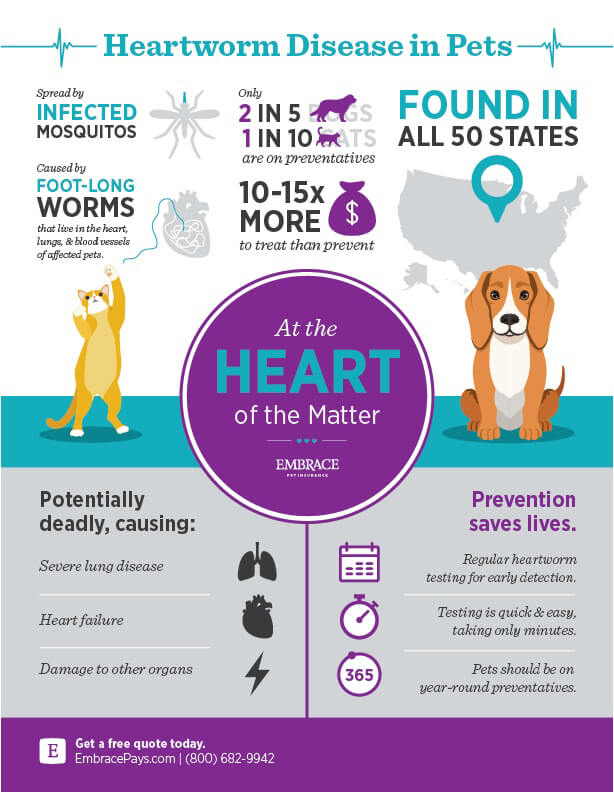Welcome to the world of pet ownership! As a responsible pet parent, it’s important to be informed about heartworm prevention for your beloved furry friend. Heartworm disease is a serious and potentially fatal condition that can affect dogs and cats, but with the right preventive measures, you can keep your pet safe and healthy. From understanding the risks of heartworm infection to learning about the different prevention options available, this article will provide you with the essential information you need to protect your pet from this dangerous parasite. Stay informed, stay vigilant, and keep your pet happy and healthy for years to come!
What You Need To Know About Heartworm Prevention
Are you aware of the dangers of heartworm disease in dogs and cats? In this article, we will discuss everything you need to know about heartworm prevention to keep your furry friend safe and healthy.

This image is property of www.amcny.org.
Understanding Heartworm Disease
Heartworm disease is a serious and potentially fatal condition caused by parasitic worms that invade the heart, lungs, and blood vessels of your pet. The worms, known as Dirofilaria immitis, are transmitted through the bites of infected mosquitoes. Once inside your pet’s body, the worms can grow up to a foot long and cause severe damage to the heart and lungs.
It’s important to understand the life cycle of heartworms to effectively prevent and treat the disease. By knowing how the parasites develop and spread, you can take the necessary precautions to protect your pet.
Preventive Measures
Preventing heartworm disease is much easier and safer than treating an infected pet. There are several preventive measures you can take to reduce the risk of your pet contracting heartworms:
-
Monthly Preventive Medication: The most common and effective way to prevent heartworm disease is by giving your pet monthly preventive medication. These medications come in various forms such as chewable tablets, topical solutions, and injectables. Make sure to consult your veterinarian to determine the best option for your pet.
-
Annual Heartworm Test: It is recommended to have your pet tested for heartworms annually, even if they are on preventive medication. Early detection is key to successful treatment, and a simple blood test can detect the presence of heartworms in your pet’s system.
-
Mosquito Control: Since heartworms are transmitted through mosquito bites, it’s essential to control the mosquito population around your home. Remove standing water, use mosquito repellents, and consider using mosquito traps to minimize the risk of exposure.

This image is property of images.ctfassets.net.
Choosing the Right Preventive Medication
When it comes to choosing the right heartworm preventive medication for your pet, there are several factors to consider. Each pet is different, and what works for one may not necessarily work for another. Here are some things to keep in mind:
-
Type of Pet: Some heartworm preventives are specifically formulated for dogs, while others are designed for cats. Make sure to use the appropriate medication for your pet’s species to ensure effectiveness and safety.
-
Weight: The dosage of preventive medication is often based on your pet’s weight. It’s crucial to accurately weigh your pet and follow the dosage instructions provided by your veterinarian to avoid under or overdosing.
-
Administering Method: Consider your pet’s preferences and your lifestyle when choosing the form of preventive medication. While some pets may easily take chewable tablets, others may do better with topical solutions or injections.
This image is property of media.defense.gov.
Monitoring Your Pet’s Health
Regular monitoring of your pet’s health is essential to detect any signs of heartworm disease early on. While preventive medication is highly effective, no method is foolproof, and there is still a small chance of your pet contracting heartworms. Keep an eye out for the following symptoms:
- Coughing
- Difficulty breathing
- Lethargy and decreased appetite
- Weight loss
- Swollen abdomen
If you notice any of these signs in your pet, contact your veterinarian immediately for testing and treatment.

This image is property of noahapopka.com.
Treatment Options for Heartworm Disease
If your pet is diagnosed with heartworm disease, don’t panic. While treatment can be challenging and expensive, many pets successfully recover with proper care. The treatment for heartworm disease typically involves multiple steps:
-
Stabilization: Before starting treatment, your veterinarian will work to stabilize your pet’s condition. This may include medications to reduce inflammation and improve circulation.
-
Administration of Treatment: The actual treatment for heartworm disease involves killing the adult worms residing in your pet’s body. This process can be risky and must be done under close veterinary supervision.
-
Recovery and Rehabilitation: After the worms are killed, your pet will need time to recover and regain strength. Your veterinarian will provide guidance on post-treatment care, including exercise restrictions and follow-up appointments.

This image is property of www.petmd.com.
Conclusion
In conclusion, heartworm disease is a serious threat to the health and well-being of your beloved pets. By taking preventive measures, monitoring your pet’s health, and seeking immediate treatment if needed, you can protect them from this potentially deadly disease. Remember to consult your veterinarian for personalized recommendations and guidance on heartworm prevention for your furry friend. Stay informed, stay proactive, and keep your pet heartworm-free!


